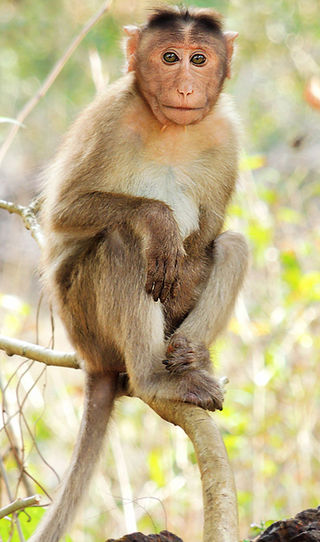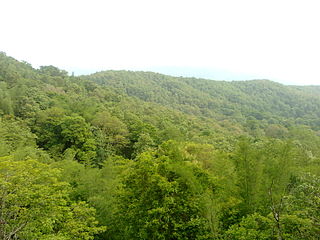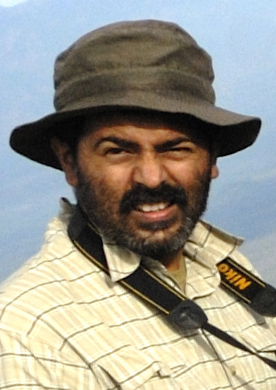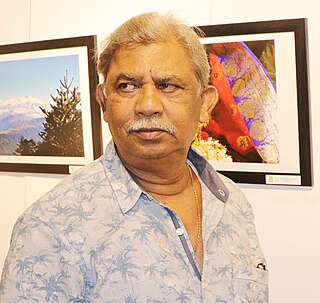
The rhesus macaque, colloquially rhesus monkey, is a species of Old World monkey. There are between six and nine recognised subspecies split between two groups, the Chinese-derived and the Indian-derived. Generally brown or grey in colour, it is 47–53 cm (19–21 in) in length with a 20.7–22.9 cm (8.1–9.0 in) tail and weighs 5.3–7.7 kg (12–17 lb). It is native to South, Central, and Southeast Asia and has the widest geographic range of all non-human primates, occupying a great diversity of altitudes and habitats.

The Arunachal macaque is a macaque native to Eastern Himalayas of Bhutan, China and India. It is listed as Endangered on the IUCN Red List.

The bonnet macaque, also known as zati, is a species of macaque endemic to southern India. Its distribution is limited by the Indian Ocean on three sides and the Godavari and Tapti Rivers, along with its related competitor the rhesus macaque in the north. Land use changes in the last few decades have resulted in changes in its distribution boundaries with the rhesus macaque, raising concern for its status in the wild.
Sinha is a surname which originates in the Indian subcontinent. The surname is commonly used by many communities including the Bengali Kayastha and the Chitraguptavanshi Kayasthas of the Hindi Belt. and is common in India, Sri Lanka, and Bangladesh. It comes from a Sanskrit word meaning "lion" or "brave person".

Tapan Sinha was one of the most prominent Indian film directors of his time forming a legendary quartet with Satyajit Ray, Ritwik Ghatak and Mrinal Sen. He was primarily a Bengali filmmaker who worked both in Hindi cinema and Bengali cinema, directing films like Kabuliwala (1957), Louha-Kapat, Sagina Mahato (1970), Apanjan (1968), Kshudhita Pashan and children's film Safed Haathi (1978) and Aaj Ka Robinhood. Sinha started his career in 1946, as a sound engineer with New Theatres film production house in Kolkata, then in 1950 left for England where he worked at Pinewood Studios for next two years, before returning home to start his six decade long career in Indian cinema, making films in Bengali, Hindi and Oriya languages, straddling genres from social realism, family drama, labor rights, to children's fantasy films. He was one of the acclaimed filmmakers of Parallel Cinema movement of India.

Parambikulam Tiger Reserve, which also includes the erstwhile Parambikulam Wildlife Sanctuary, is a 643.66 square kilometres (248.5 sq mi) protected area lying in Palakkad district and Thrissur district of Kerala state, South India. The Wildlife Sanctuary, which had an area of 285 square kilometres (110 sq mi) was established in part in 1973 and 1984. It is in the Sungam range of hills between the Anaimalai Hills and Nelliampathy Hills. Parambikulam Wildlife Sanctuary was declared as part of the Parambikulam Tiger Reserve on 19 February 2010. Including the buffer zone, the tiger reserve has a span of 643.66 km2. The Western Ghats, Anamalai Sub-Cluster, including all of Parambikulam Wildlife Sanctuary, has been declared by the UNESCO World Heritage Committee as a World Heritage Site. The Tiger Reserve is the home of four different tribes of indigenous peoples including the Kadar, Malasar tribe, Muduvar and Mala Malasar settled in six colonies. Parambikulam Tiger Reserve implements the Project Tiger scheme along with various other programs of the Government of India and the Government of Kerala. The operational aspects of administering a tiger reserve is as per the scheme laid down by the National Tiger Conservation Authority. People from tribal colonies inside the reserve are engaged as guides for treks and safaris, and are provided employment through various eco-tourism initiatives. Parambikulam Tiger Reserve is among the top-ten best managed Tiger Reserve in India. The tiger reserve hosts many capacity building training programmes conducted by Parambikulam Tiger Conservation Foundation in association with various organisations.

The state of Karnataka in South India has a rich diversity of flora and fauna. It has a recorded forest area of 38,720 km2 which constitutes 55% of the geographical area of the state. These forests support 25% of the elephant population and 20% of the tiger population of India. Many regions of Karnataka are still unexplored and new species of flora and fauna are still found.

The Nature Conservation Foundation is a non-governmental wildlife conservation and research organisation based in Mysore, India. They promote the use of science for wildlife conservation in India.

Mysore Doreswamy Madhusudan is an Indian wildlife biologist and ecologist. He is the Co-founder and Director of Nature Conservation Foundation, Mysore and a Visiting Research Fellow at the University of Leeds. He has worked on understanding and mitigating the effects of human-wildlife conflict in the Nilgiri Biosphere Reserve in South India. He has also worked in several other forests in the Himalayas and North-east India. In 2004, he was one among the team of wildlife biologists who described Arunachal macaque, a new species of macaque from Arunachal Pradesh, India.

JayamangaliBlackbuck Conservation Reserve is Tumkur district's only notified protected area. It neighbours Maidenahalli, a small village in Madhugiri Taluk, at the north-eastern tip of Tumkur district of Karnataka state, India. This area is a part of the plains of Deccan plateau and borders Anantapur district of Andhra Pradesh. It is a 798-acre (3.23 km2) patch of grassland with Eucalyptus and Acacia auriculiformis. It has the largest contiguous population of blackbuck in Karnataka, apart from Ranibennur Blackbuck Sanctuary.

Cinema of West Bengal, also known as Tollywood or Bengali cinema, is the segment of Indian cinema, dedicated to the production of motion pictures in the Bengali language widely spoken in the state of West Bengal. It is based in the Tollygunge region of Kolkata, West Bengal, India. The origins of the nickname Tollywood, a portmanteau of the words Tollygunge and Hollywood, dates back to 1932. It was a historically important film industry, at one time the centre of Indian film production. The Bengali film industry is known for producing many of Indian cinema's most critically acclaimed global Parallel Cinema and art films, with several of its filmmakers gaining prominence at the Indian National Film Awards as well as international acclaim.

The National Investigation Agency (NIA) is a specialised counter-terrorism law enforcement agency in India. The agency is empowered to deal with the investigation of terror related crimes across states without special permission from the states under written proclamation from the Ministry of Home Affairs. The primary mandate of the National Investigation Agency is to investigate and prosecute offences that have national and cross-border implications, specifically focusing on terrorism, insurgency, and other related matters. It is empowered to investigate cases that involve threats to the sovereignty, security, and integrity of India. It has the authority to conduct searches, make seizures and arrests, as well as to collect evidence and maintain a database of terrorist organisations and their members.
Sharada SrinivasanFRAS FAAAS is an archaeologist specializing in the scientific study of art, archaeology, archaeometallurgy and culture. She is a Professor at the National Institute of Advanced Studies, Bangalore, India, and an Honorary University Fellow at the University of Exeter, UK. Srinivasan is also an exponent of classical Bharatanatyam dance. She was awarded India's fourth highest civilian award the Padma Shri in 2019. She is a member of the Calamur family.

Raja Sen is an Indian film and television director and the winner of three National Film Awards from Kolkata, West Bengal, India. He is the father of Subhasree Sen and Sreyoshri Sen.
Arundhati Devi was an Indian actress, director, writer and singer who is predominantly known for her work in Bengali cinema.

Ajay Kumar Parida was an Indian biologist noted for his contributions in the fields of agriculture, plant molecular biology and biotechnology. In 2014, Parida was awarded the Padma Shri Award by the President of India for his contribution in the field of Science and Technology.

National Institute of Advanced Studies (NIAS) is a premier institute in India engaged in interdisciplinary and multidisciplinary research in natural sciences, social sciences, arts and humanities. It was founded by J. R. D. Tata for providing an avenue for administrators, managers and social leaders for interaction and exchange of information with notable academics in the areas of science, arts and humanities. With these objectives, the institute conducts multi-level research programmes and mentors talented doctoral students. The institution, based in Bengaluru, in the south Indian state of Karnataka, started functioning on 20 June 1988 with Dr. Raja Ramanna as its founder director.
Badanaval Venkatasubba Sreekantan was an Indian high-energy astrophysicist and a former associate of Homi J. Bhabha at the Tata Institute of Fundamental Research (TIFR). He was also a Dr. S. Radhakrishnan Visiting Professor at the National Institute of Advanced Studies, Bangalore.

Ekhoni is a 1971 Bengali film directed by Tapan Sinha, starring Aparna Sen, Moushumi Chatterjee, Chinmoy Roy and others. Based on the award-winning novel of the same name by Ramapada Chowdhury, Ekhoni was one of the earliest films to address the problems of urban youth, and to replace the individual hero by a collective protagonist. At the 19th National Film Awards, it won the National Award for Best Screenplay. It also won two BFJA Awards.
Atanka is a 1986 Indian Bengali language political crime thriller film directed by Tapan Sinha. The film stars Soumitra Chatterjee, Prosenjit Chatterjee, and Satabdi Roy in her debut film. The film was known for its dark-tone and outstanding performances of the cast. The film ran for around 90 consecutive days at Mitra cinemas, west Bengal. The film was both critically and commercially successful and won 7 awards, and got an official entry at the Indian Panorama Section.















